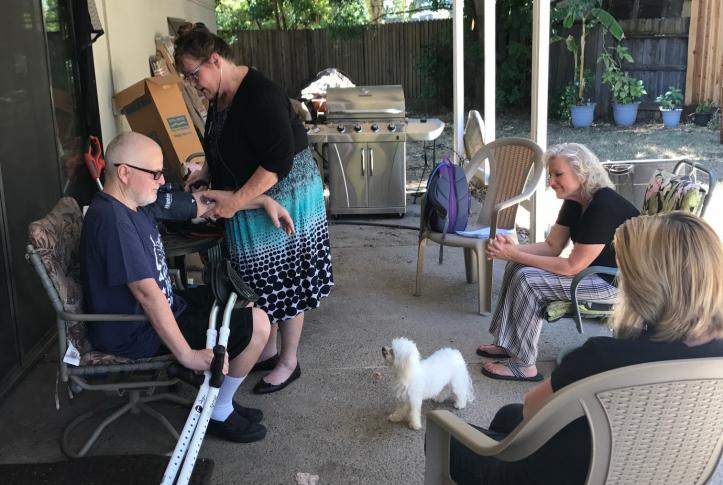Placing much of the blame for recent declines in average U.S. life expectancy on “the way the U.S. health care system functions,” Commonwealth Fund President David Blumenthal, M.D., says the nation needs fundamental change, including “reforming our pharmaceutical markets and making good health insurance available to all Americans.” In an op-ed published in STAT, Blumenthal discusses new data from the Centers for Disease Control and Prevention showing that average life expectancy at birth fell in 2016 by 0.1 years, to 78.6, after a similar drop in 2015. In 25 other developed countries, life expectancy in 2015 was 81.8 years.
The Connection: Falling U.S. Life Expectancy; 10 Ways Health Care in America Changed in 2017; and Much More
Blumenthal: Falling U.S. Life Expectancy an ‘Indictment of the American Health Care System’

10 Ways Health Care in America Changed in 2017

On To the Point, the Commonwealth Fund’s Shanoor Seervai and David Blumenthal, M.D., look at 10 critical events in health care during 2017, starting with the failed effort to repeal and replace the Affordable Care Act.
New Tax Legislation: Less for U.S. Health Care

The recently passed tax bill “will mean less health insurance for individuals; less coverage for elderly and poor Americans; less revenue for doctors, hospitals, and myriad health care businesses; and, quite possibly, a less-healthy, less-productive workforce,” says Commonwealth Fund President David Blumenthal, M.D., in a new editorial for Harvard Business Review.
In a related To the Point post, the Commonwealth Fund’s Eric Schneider, M.D., Arnav Shah, and Shawn Bishop explain how the tax law is likely to accelerate deficit spending while ignoring Medicare beneficiaries’ growing needs. “For the more than 80 million Americans who will need Medicare coverage in 2030, the tax bill sets up needlessly painful decisions that will affect their health and financial security in the future,” the authors say.
Understanding State 1115 Waivers Designed to Reduce Medicaid Eligibility

Guidance released last week by the Centers for Medicare and Medicaid Services could speed up approval of Section 1115 demonstration waivers, which allow states to test innovations in Medicaid without formal legislative action. As George Washington University’s Sara Rosenbaum and colleagues explain on To the Point, these demonstrations could add conditions for Medicaid coverage, such as work requirements, monthly premium obligations, and limits on how long beneficiaries can be enrolled.
Report: Progress in Health Care Access, But Gains Now in Jeopardy

Forty-seven states saw their adult uninsured rate drop by five percentage points or more in the first three years following the Affordable Care Act’s (ACA) major coverage expansions, according to a new Commonwealth Fund scorecard. And in nearly three-quarters of states, fewer people skipped needed care because of costs. However, recent policy developments — most notably the Republican tax bill’s repeal of the ACA’s individual mandate penalties and a failure to extend federal funding for the Children’s Health Insurance Program — could cause a spike in premiums for people buying health insurance on their own and lead to a reversal of gains.
Insurer Participation in ACA Marketplaces

Analysis from Georgetown University’s Emily Curran, Justin Giovannelli, and Kevin Lucia on To the Point sheds light on how states have maintained competition in their health insurance marketplaces despite uncertainty.
Care for Millions at Risk as Community Health Centers Lose Billions in Funding

Congress has thus far failed to renew a critical financing source for community health centers, which provide primary care to one of 13 Americans, regardless of their ability to pay. The Commonwealth Fund’s Corinne Lewis, Pamela Riley, M.D., and Melinda Abrams point out that the funding cut could lead to a quarter of health centers sites closing, 51,000 workers being laid off, and 9 million people losing care.
How Have Coverage Expansions Affected Young Adults?

Young adults are among those Americans who have signed up for 2018 health plans in the ACA marketplaces. According to Commonwealth Fund survey findings, men and women 19 to 34 have in fact made the largest coverage gains of any age group since the ACA went into effect, write Munira Gunja, Sophie Beutel, and Sara Collins on To the Point. And having this coverage, they say, is making health care affordable for them.
Is Medicare Still Paying Private Health Plans Too Much?

The way private insurance plans are paid to provide benefits to Medicare enrollees doesn’t encourage them to be as efficient as they could be, a Commonwealth Fund–supported analysis finds. Researchers Stephen Zuckerman and Laura Skopec of the Urban Institute and independent health economist Stuart Guterman find that the bidding system Medicare uses to induce Medicare Advantage plans to provide benefits at lower costs is not having its intended effect in many regions. They suggest ways it could be made more efficient.
Keep Harmful Cuts in DSH Payments at Bay

Congress has thus far failed to act to delay a reduction in funding for supplemental payments to hospitals serving high numbers of low-income patients. On To the Point, George Washington University’s Sara Rosenbaum says the Medicaid disproportionate share hospital (DSH) payments are crucial for hospitals in the poorest communities — particularly those in states that did not expand Medicaid.
How Hurricane Maria Worsened Puerto Rico's Health Care Crisis

More than three months have passed since Hurricane Maria devastated Puerto Rico, worsening longstanding economic and health challenges. As the Commonwealth Fund’s Shanoor Seervai explains, the storm has exacerbated existing fault lines in the territory’s health system. A combination of extreme poverty and deprivation threatens the health of Puerto Ricans, who are generally in poorer health than mainland Americans and heavily reliant on an underfunded Medicaid program.
Transforming Care: Spreading Innovative Approaches to Dementia Care

In parts of the U.S. that lack specialized care centers for patients with Alzheimer’s disease and other forms of dementia, newly diagnosed patients and their loved ones struggle to manage what can be a long, progressive decline. The new issue of Transforming Care profiles innovative dementia care models that help patients and family caregivers cope with the physical symptoms of dementia, monitor its effects on other chronic conditions, and offer strategies for behavioral and psychosocial problems.
Case Study: Helping Patients Navigate Advanced Illness

A new case study in the Commonwealth Fund’s series Care Models for High-Need, High-Costs Patients examines the potential of the Advanced Illness Management (AIM) program to support patients as they move from intensive curative treatment to end-of-life care. Developed by Sutter Health, a nonprofit integrated delivery system in Northern California, AIM relies on nurses and social workers to engage patients, elicit and document their goals as their needs evolve, and support them in navigating physical and emotional challenges.
Can the New Health Care Mega Mergers Succeed?

"Is free-market magic finally bringing Amazon-style convenience, quality, and efficiency to health care?” asks Commonwealth Fund president David Blumenthal, M.D., in an essay published in Harvard Business Review. To answer this question, Blumenthal looks at the recently announced CVS-Aetna and UnitedHealth-DaVita mergers.
How to Strengthen Local Partnerships to Integrate Health, Social Needs

Many U.S. communities are launching efforts to connect health care providers with local organizations that can help patients get essential nonmedical services. In a new Commonwealth Fund brief, Ruben Amarasingham, M.D., founder of Pieces Technologies, which develops collaboration tools for health systems and community-based organizations, profiles several of these efforts. He and his colleagues offer practical approaches to help these programs achieve financial sustainability, measure health outcomes and cost-savings, and leverage technology.
What’s the Best Way for Organizations to Embed Innovation?
Drawing on a review of 60 innovation centers in the U.S., Onil Bhattacharyya, M.D., a 2015–16 Canadian Harkness Fellow, together with the Commonwealth Fund’s David Blumenthal, M.D., and Eric Schneider, M.D., explore in a recent NEJM Catalyst article how health systems can organize themselves to redesign health care services, develop digital health tools, or create new models of care.
Sick and Alone: High-Need, Socially Isolated Adults Have More Problems, Less Support

For high-need patients with multiple chronic medical conditions and physical or cognitive limitations, the added burden of social isolation can make them more vulnerable to mental, emotional, and financial issues, according to a new analysis of the Commonwealth Fund Survey of High-Need Patients. On To the Point, researchers Corinne Lewis, Tanya Shah, and Melinda K. Abrams also report that these adults are less likely to receive timely, good-quality care than high-need adults who do not report feeling alone.
The Commonwealth Fund’s Top 10 for 2017
By any measure, health care was one of 2017’s biggest issues, with ACA repeal-and-replace efforts dominating the headlines — as well as the Commonwealth Fund’s web and social media output. Our projections for the repeal bills’ impact on jobs, state economies, and Medicaid were among our most-read pages of the year.
International Study One of Health Affairs’ Top 10
A report on the findings from the 2017 Commonwealth Fund International Health Policy Survey of Older Adults was among the 10 most-read articles published in Health Affairs last year. The study by the Fund’s Robin Osborn, Michelle Doty, Donald Moulds, Dana Sarnak, and Arnav Shah found that U.S. seniors were sicker than their counterparts in other countries and, despite Medicare’s universal coverage, faced more financial barriers to health care.